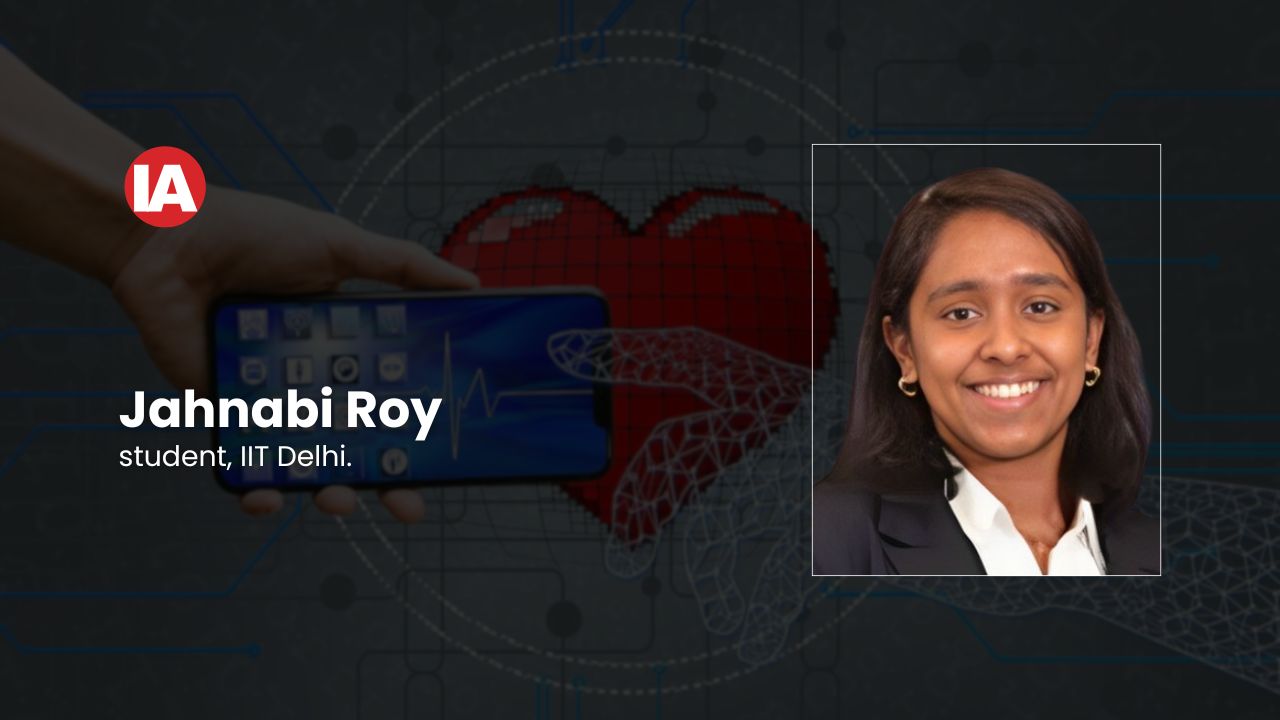
Learning AI in Healthcare
The ethical adoption of AI and automation in healthcare is transforming the industry, driven by advancements in digital health, big data analytics, and IoT. Jahnabi Roy, a B.Tech student at IIT Delhi, explores the dynamic intersection of technology and medicine, highlighting the need for innovation, collaboration, and AI ethics to shape a sustainable future.
![[object Object]](https://admin.industrialautomationindia.in/storage/articles/article-RZxSmTAsFNjCloVMH4tdxMVCkzSuA13p6hnrAFss.jpg)
Many young computer scientists/engineers are excited about the potential growth in ethical adoption of AI and Automation in the healthcare domain, says Jahnabi Roy.
Healthcare global ecosystem today is in constant flux. New business models, new technologies are emerging. Market needs and patient behaviours are evolving. In the era of Artificial Intelligence (AI), human intellectual powers are now simulated, multiplied, and partially substituted by AI driven digitalisation.

Data, whether big or smart, does not create value per se. It is algorithms that have a real value. While data is called the gold of the digital era, it is the possibilities of analysing this data to become usable results that generate the effective value. Algorithms are more important for analysing this data and the driving force for digital health. Complex algorithms create sustainable competitive advantage when applied with the right business models.
The healthcare sector is the primary source of the world’s data, generating nearly a third of all the global data. So, hospitals can gain a lot with big data technology. Using big data analytics software and tools, healthcare professionals can extract valuable insights from the information they already possess in various ways such as examining the patient records, medical imaging to support diagnostics and treatment development, predict potential health hazards by studying the pattern and correlation in health data, shift in epidemiology situations, etc.
Automation and AI has the potential to address some of the new age problems such as aging population and expensive elderly care, impact of climate change, shift in lifestyle choices, remote care, personalised care delivery, etc.
I have had many opportunities to attend a few national and international level digital health summits in India in the last 2 years and have interacted with a few senior healthcare/digital health stakeholders. Digital health ecosystem is still evolving and steadily adopting the new age technologies such as machine learning, generative AI, etc.
We are still far away from having AI robots having complete complex procedures without human intervention even in the USA but the adaptation of the technology for minor aspects of routine tasks will grow in the near future.
Electronic Health Record (EHR) has been one of the megatrends in healthcare technology for the last few years that serves as a centralised repository for patient data and facilitates the exchange of patient data across various healthcare facilities. This promises data driven clinical decision making and improves interoperability for better patient outcomes. Privacy concerns and local Government regulations need to be factored in while designing such systems in the local healthcare ecosystem.
In India, Electronic Health Records (EHR) are not widely implemented, although most hospitals have some type of Hospital Information System (HIS), and only a few have a basic Electronic Medical Record (EMR) system.
Telehealth and EMR systems together work tremendously well, in providing high-quality patient care in a remote environment, including well synchronised insurance information.
The Internet of Medical Things (IoMT) and wearable devices are helping healthcare professionals track patients’ health more accurately and build personalised treatment plans. On the patient’s side, using these devices fosters a greater awareness of personal health. With access to real-time data, individuals can better understand their sleep patterns, eating habits, activity levels, and other health-related behaviours.
There are many mobile health (mHealth) apps available on major Google Play and AppStore platforms for various applications such as Telehealth, Medication Management, Fitness & Wellness, Mental Health, Appointment scheduling, etc.
India has 70-80% import dependency on medical devices. Global big brands are steadily growing their commitment to the India market via various local collaborations and global capability centres (GCC).
I can imagine a future in which huge databases from implants and wearables change our perception of human biology and of how drugs and formulations work, enabling real time and personalised treatment for all.
AI can improve the speed and accuracy in use of diagnostics, give practitioners easier and faster access to more patient-oriented knowledge and enable remote monitoring through self-care.
There are many great initiatives by trade associations and other stakeholders in this digital health journey. But the key challenge for learning and early adoption is how to resist the bias against doing new things, scanning the horizon for growth opportunities, and pushing yourself to acquire radically different capabilities, while still performing your job.
The senior stakeholders including the Government and Regulators consistently encourage the audience to ask and answer a few curious questions about the new topic instead of focusing on and reinforcing initial disinterest in a new subject. That sparks curiosity for the learners and early adopters. This is a good way to shift the focus from the challenges to the benefits and increase the aspiration of the stakeholders to do initially unappealing things.
NABH (National Accreditation Board for Hospitals and Healthcare Providers), a constituent board of Quality Council of India, has taken initiative to introduce common vocabulary for standardised business communication such as RFP, etc.
In fact, the great learners always allow themselves to be vulnerable enough to accept that they are novice in this subject. This attitude makes them more relaxed. They start asking the necessary questions, and soon they are seen as open, interested, and beginning to understand their new environment.
Many startups or players in emerging economies are interested in scaling any new AI powered conceptor solution very fast. Startups/innovators and the practitioners must embrace the importance of AI ethics or possible algorithm bias so that any new solution will ‘do no harm’ before it reaches any patient. AI can not be treated like a black box approach in the healthcare sector. California in the USA recently has recognised officially the importance of mental privacy in State Law. Neural data needs to be protected. So collaboration and transparency are key ingredients for a win-win playbook in the digital health sector.
Demand for data scientists will intensify across industries and the competition of the talent will be fierce. Many young computer scientists/engineers are excited about the potential growth in ethical adoption of AI and Automation in the healthcare domain. Developing a flexible and agile organisation model to attract and retain such talent will be a key part of the business strategy specifically in emerging economies such as India.
Jahnabi Roy is a 3rd year student pursuing a B.Tech in Computer Science and Engineering at IIT Delhi. In her own words: ‘I am a curious and creative individual with strong analytical skills and a knack for problem-solving. I aspire to be an interdisciplinary professional, combining computer science and technology with the medical sciences, space research and allied fields’.
AMETEK acquires Virtek Vision International

AMETEK Inc., has announced the acquisition of Virtek Vision International, a leading provider of advanced laser-based projection and inspection systems.
Virtek specialises in the development and manufacturing of advanced 3D laser projectors, smart cameras, and quality control inspection systems, powered by AI-driven software and algorithms. Their innovative machine vision solutions provide customers with precise, virtual laser guided measurement and inspection capabilities to help automate complex assembly processes and improve manufacturing efficiencies across a wide range of aerospace, defense and industrial applications.
"We are excited to welcome Virtek to the AMETEK family," said David A. Zapico, AMETEK Chairman and Chief Executive Officer. "Virtek is an outstanding acquisition and an excellent strategic fit with our Creaform business. Their strong technology capabilities nicely complement Creaform's enabling a broader suite of automated 3D scanning and inspection capabilities supported by advance software and algorithms."
Virtek is headquartered in Waterloo, Canada and has annual sales of approximately $40 million. Virtek will join AMETEK as part of its Electronic Instruments Group (EIG) – a leader in advanced analytical, monitoring, testing, calibrating and display instrumentation.
_____________________________________________________________________________________________
For a deeper dive into the dynamic world of Industrial Automation and Robotic Process Automation (RPA), explore our comprehensive collection of articles and news covering cutting-edge technologies, robotics, PLC programming, SCADA systems, and the latest advancements in the Industrial Automation realm. Uncover valuable insights and stay abreast of industry trends by delving into the rest of our articles on Industrial Automation and RPA at www.industrialautomationindia.in